
History of the Kiel Institute
The Kiel Institute for the World Economy has existed for more than 100 years. It looks back on a rich and changeful history in which the scientific work was always oriented to political movements and global economic challenges of each era. Since its foundation the institute has a high reputation in theoretically based and empirically supported handling of current global economic questions. This reputation in the international scientific community was lost temporarily during the time the institute was in service of the NS-regime.
Today
Our mission:
Understanding and Shaping Globalization
Today, the Kiel Institute for the World Economy sees itself as the research institute in Germany for globalization issues. Our researchers investigate the drivers and effects of international economic activity, the integration and disintegration of global markets as well as the opportunities and limits of political action in open economies. The Institute analyzes the world economy not just as the sum of individual national economies, but rather as a global economic area that must be understood and shaped. We have tasked ourselves with identifying emerging global economic challenges and developing practical solutions that are compatible with open markets and competition while also taking account of everyone’s standard of living.

|
2004 — 2019
The institute faces up to social scientific responsibility
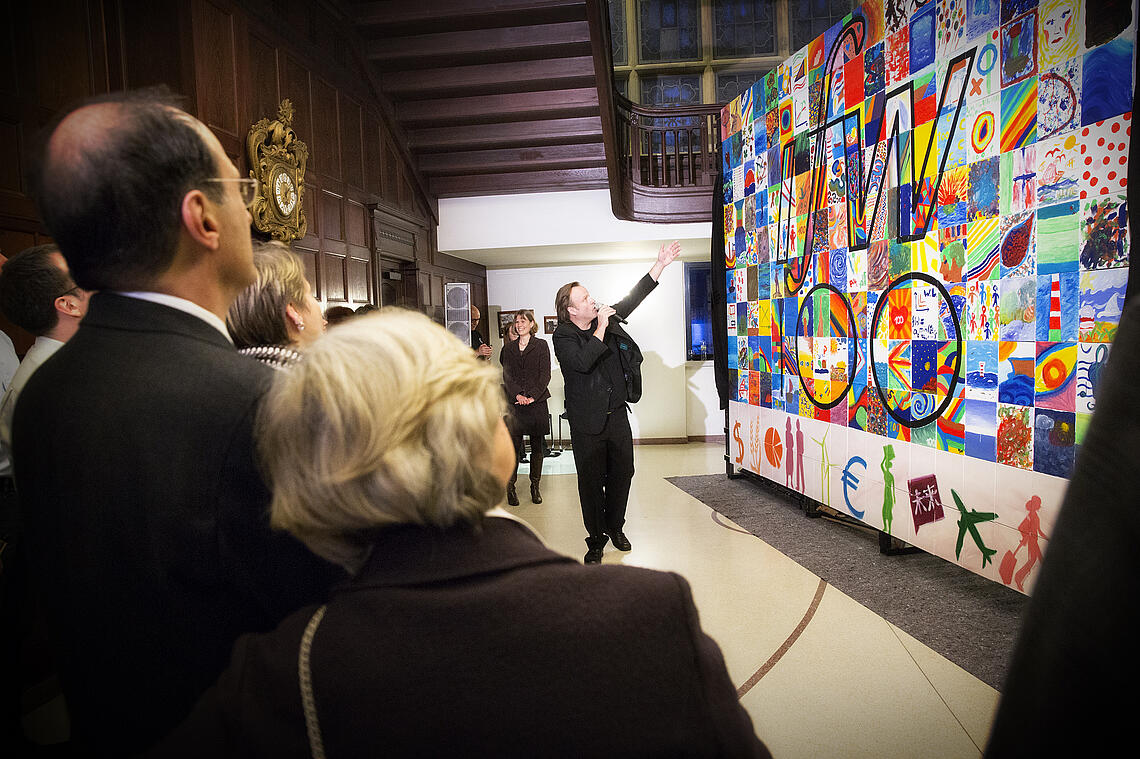
Following an interim phase, in 2004 the American economist Dennis J. Snower became the first non-German scientist to take over the leadership of the institute. He rigorously aligns the activities of the institute with the demands of the evaluations for more scientific quality and international networking. In addition, the Institute develops new forms and formats of scientific consulting in the context of broader social science research. Examples of this are the Global Economic Symposium and the Global Economy Prize. For the first time, transfer services in training alongside the proven postgraduate program are oriented to the needs of young researchers in political institutions. Interdisciplinary cooperation with the University of Kiel is intensified by joint professorships and the Leibniz Campus Kiel Centre for Globalization.
The financial and economic crisis of 2008 also triggered discussions about the self-image of economics. As a result, the Institute broadens its perspective in research and consulting and, for the first time, includes behavioral economic research in its research profile. It is concerned with the trade-offs between selfish and benevolent actions by individuals as an important benchmark for relevant social science research.
|
1969 — 2003
Leading the way in times of global economic shocks
In 1969 Herbert Giersch took over the leadership of the institute. He combines Schumpeterian and Keynesian research approaches in a way that is clearly oriented towards economic policy relevance. With his international network, he takes up financial and real economic shocks in the global economy and makes the Institute's research and policy advice heard globally. During this time, the Institute has become both a network and a place of residence for many international researchers working on the location conditions in the global economic division of labor. Clear statements on coming challenges (including "Eurosclerosis") and how to overcome them provoke critical dissent in politics and the public, which gives the Institute a reputation as a refuge for one-sided supply-side policies.
Giersch's successor Horst Siebert (President from 1989-2003) continues this strong presence in policy consulting at the national (e.g. Council of Economic Experts) and international level (e.g. International Monetary Fund). Also under his leadership, the institute quickly takes up new challenges of systemic shocks (reunification, collapse of the socialist system in Eastern Europe, national debt crises) in research and consulting and opens up original fields of research in environmental economics. The regular external evaluations of the Institute's performance, which began in this era, call for a clearer focus on scientific excellence.
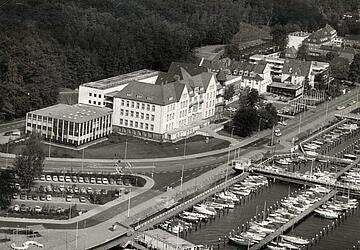
|
1945 — 1968
Regaining moral reputation and scientific quality
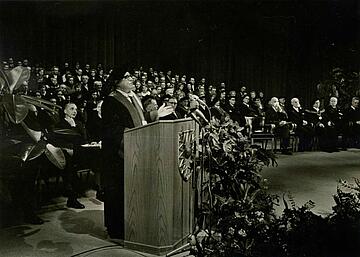
After an interim period, the directors Fritz Baade and (from 1961) Erich Schneider determine the profile of the institute from 1948. Thanks to his personality of integrity, his contacts to the international knowledge community and his versatility as a manager, politician and scientist, Baade gives the Institute back the moral reputation it lost after 1933. Under his aegis, the institute becomes a meeting place for later Nobel Prize winners on future topics such as the fight against poverty, hunger, lack of resources and armament.
Erich Schneider determines the Institute's theoretical orientation towards Keynesian-influenced research and education. Under his leadership, the Institute became the origin of many university teaching careers and, with its outstanding library, the indispensable residence of many researchers and lecturers. During this period, the Institute begins to incorporate the world economic environment, which is characterized by sectoral structural change, global trade liberalization and the gradual deepening of European integration, into its research spectrum.
|
1933 — 1945
Compliant in service of wartime economy
In 1933, the National Socialists remove founding director Bernhard Harms and appoint first Jens Jessen and shortly thereafter Andreas Predöhl as directors of the institute, which was renamed the "Kiel Institute for the World Economy" in 1934. Predöhl's submissiveness to the Nazi regime from 1934 on will influence the entire work of the institute until the end of the war.
With the violent expulsion of the leading researchers of the Astwik Department, the institute loses its research competence and becomes the German center of empirical evidence on the world economy.
Innovation in people's minds is replaced by the knowledge of data and documents, which is subjected to "defense economic" research without resistance from 1939 onwards.
Thanks to a foresighted relocation of the library, the entire literature and archive holdings are spared the destruction of the war in Kiel.
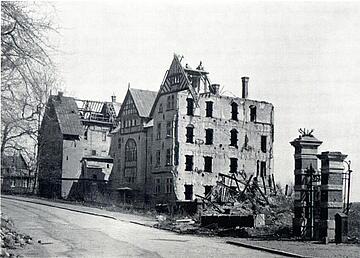
|
1914 — 1933
Moving from information literacy to top-level research
Established in February 1914 under the formative influence of its founding director Bernhard Harms, the " Königliches Institut für Seeverkehr und Weltwirtschaft an der Universität Kiel" (Royal Institute of Shipping and the World Economy at the University of Kiel), as it was originally called, initially placed itself at the service of war research. It offers its extensive stock of material on the warring powers to monarchist Germany for consultation on issues relevant to military warfare.
From 1920 onwards, with the end of the First World War, the move to the new building at the Kiel fjord with spatial and personnel expansion and the democratically influenced political reorientation, Bernhard Harms set the course for research quality. Commissioned project work is supplemented by basic research. This is bundled in the establishment of the Department of Statistical World Economics and International Business Cycle Research (Astwik), which within seven years until 1933 achieves an international reputation in business cycle research.
However, the ideal pursued by Harms to develop a theoretically founded theory of world economics is neither implemented by himself nor by the Astwik department.
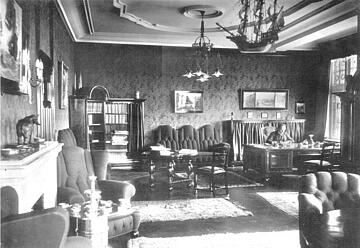
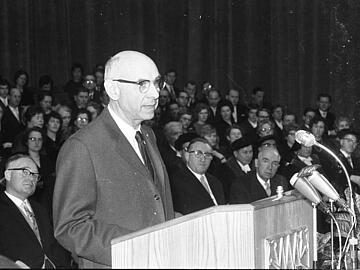
Its last director, Gerhard Colm (born June 30, 1897, died December 26, 1968), shaped the Kiel Institute's research expertise, particularly in the area of medium-term budget planning and the growth effects of government spending. He and his family were forcibly expelled from the Institute and Kiel in 1933 and found a new academic and private home in the United States. Gerhard Colm became an important economic advisor to President Roosevelt during the war years and to President Truman in the post-war years. The latter entrusted him with the design and implementation of the German currency reform in 1948. In 1964, on the occasion of the fiftieth anniversary of the Institute, he returned to Kiel and received the Bernhard Harms Prize, awarded for the first time in recognition of his scientific achievements. In the last years of his life in the USA, he devoted himself mainly to global economic issues with a focus on the development of efficient national budgets in developing countries.